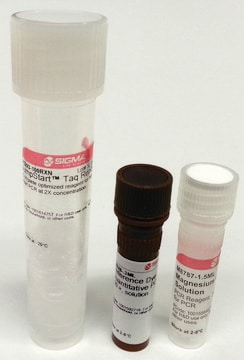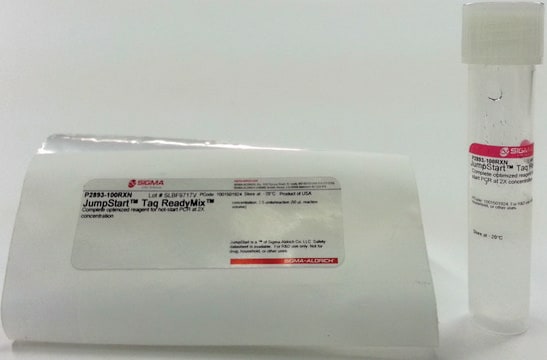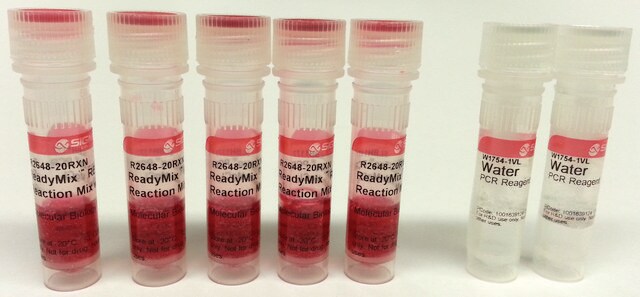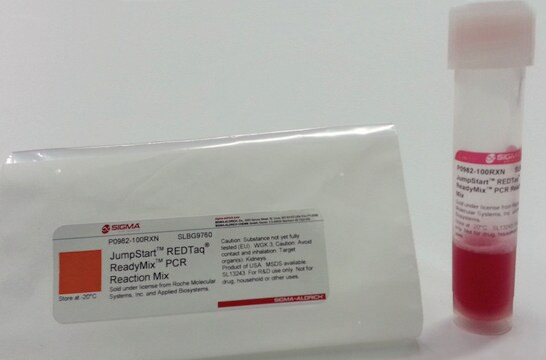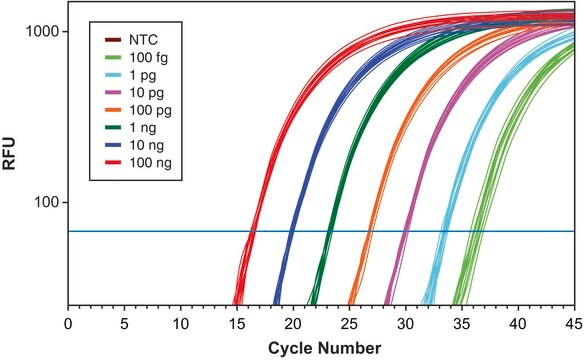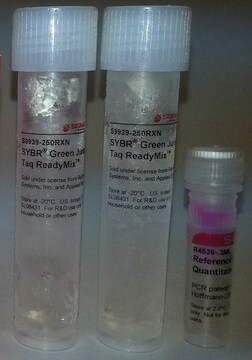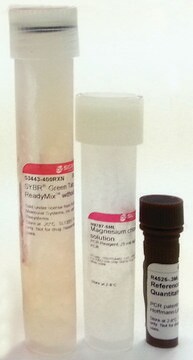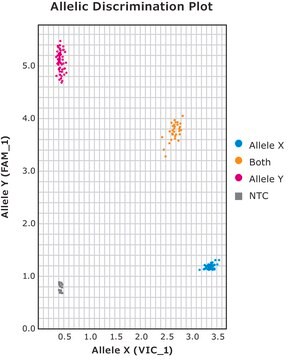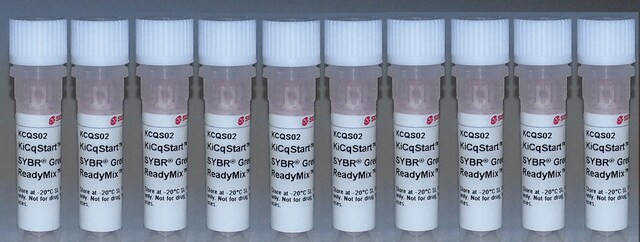D6442
JumpStart™ Taq ReadyMix™ for High Throughput Quantitative PCR
Ready-to-use 2x mix for qPCR with ROX
Synonym(s):
Taq polymerase mix
About This Item
Recommended Products
form
liquid
usage
sufficient for 20 reactions
sufficient for 2000 reactions
sufficient for 400 reactions
feature
dNTPs included
hotstart
concentration
2.5 units/reaction (50 μL reaction volume)
technique(s)
qPCR: suitable
color
colorless
input
purified DNA
application(s)
agriculture
compatibility
for use with ABI 5700
for use with ABI 7000
for use with ABI 7300
for use with ABI 7500 Fast
for use with ABI 7500
for use with ABI 7700
for use with ABI 7900 Fast
for use with ABI 7900 HT
for use with ABI 7900
for use with ABI StepOne
for use with ABI StepOnePlus
for use with ABI ViiA 7
for use with Bio-Rad CFX384
for use with Bio-Rad CFX96
for use with Bio-Rad MJ Chromo4
for use with Bio-Rad MJ Opticon 2
for use with Bio-Rad MJ Opticon Cepheid SmartCycler
for use with Bio-Rad MJ Opticon
for use with Bio-Rad MiniOpticon
for use with Eppendorf® Mastercycler ep realplex2 s
for use with Eppendorf® Mastercycler ep realplex
for use with Illumina Eco qPCR
for use with Qiagen Corbett Rotor-Gene 3000
for use with Qiagen Corbett Rotor-Gene 6000
for use with Qiagen Corbett Rotor-Gene Q
for use with Roche LightCycler 480
for use with Strategene Mx3000P
for use with Strategene Mx3005P
for use with Strategene Mx4000
detection method
probe-based
shipped in
wet ice
storage temp.
−20°C
General description
To prepare a typical qPCR reaction, mix 25 μL of JumpStart ReadyMix Taq, fluorescent probe, desired amount of magnesium chloride (above 1.5 mM final concentration), template DNA, and primers in a final volume of 50 μL. Reaction volumes can be scaled down, if desired.
Application
- For quantitative polymerase chain reaction (qPCR) of cDNA template
- As a component of PCR reaction mix for amplification of DNA extracted from peripheral blood leucocytes
- For qPCR amplifications using SYBR
- For multiplex PCR
- For reduction of primer dimers
Features and Benefits
- JumpStart™ Taq DNA polymerase prevents amplification of non-specific products, resulting in increased efficiency and higher target yield
- When performing large number of PCR reactions, JumpStart™ Taq ReadyMix™ reduces preparation time and the risk of contamination from multiple pipetting steps
- This master mix allows consistent batch-to-batch and reaction-to-reaction performance
- Internal Reference Dye is provided for reaction normalization
Packaging
20RXN is packaged as 1 X 500 μL
400RXN is packaged as 1 X 10 mL
2000RXN is packaged as 1 X 50 mL
Quantity
Legal Information
related product
Signal Word
Danger
Hazard Statements
Precautionary Statements
Hazard Classifications
Aquatic Chronic 3 - Eye Dam. 1 - Ox. Liq. 3 - Skin Irrit. 2 - Skin Sens. 1
Storage Class Code
5.1B - Oxidizing hazardous materials
Certificates of Analysis (COA)
Search for Certificates of Analysis (COA) by entering the products Lot/Batch Number. Lot and Batch Numbers can be found on a product’s label following the words ‘Lot’ or ‘Batch’.
Already Own This Product?
Find documentation for the products that you have recently purchased in the Document Library.
Customers Also Viewed
Articles
Probe based QPCR utilizes a fluorescent–labeled target-specific probe resulting in increased specificity and sensitivity. Additionally, a variety of fluorescent dyes are available so that multiple primers can be used to simultaneously amplify many sequences.
Quantitative PCR (qPCR) provides information about gene expression, gene amplification or loss, and small alterations. qPCR is often used to investigate tumor biology and to discover the genetic and epigenetic causes of cancer
Related Content
RT-qPCR, or quantitative reverse transcription PCR, combines the effects of reverse transcription and quantitative PCR or real-time PCR to amplify and detect specific targets. RT-qPCR has a variety of applications including quantifying gene expression levels, validating RNA interference (RNAi), and detecting pathogens such as viruses.
Our team of scientists has experience in all areas of research including Life Science, Material Science, Chemical Synthesis, Chromatography, Analytical and many others.
Contact Technical Service